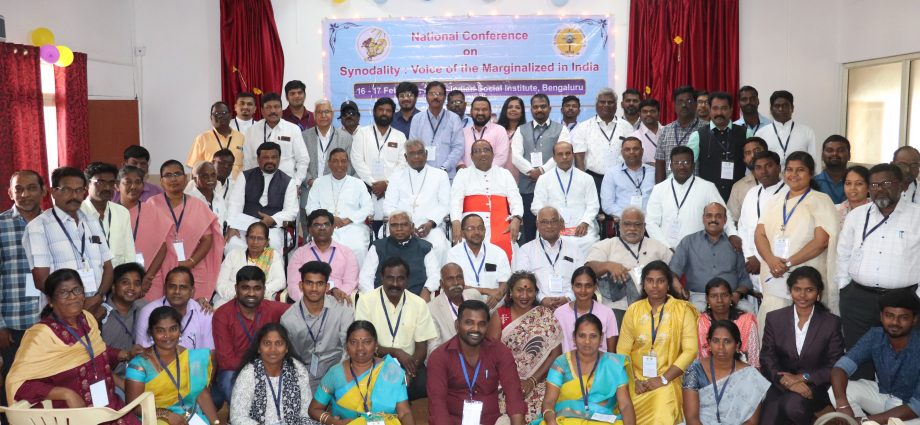By Robancy A Helen
Bengaluru, Feb 18, 2024: A national conference on synod has called for restoring the space denied to Dalit Christians in the Church and society.
The February 16-17 conference on “Synodal Church: Voice of the Marginalized in India,” studied the Dalit Empowerment Policy of the Catholic Bishops’ Conference of India, 2016, that mandates an end to caste practices and promotes inclusive communities. The policy also focuses on the denied space of Dalit Christians in the Church and society.
“The very focus of the Synodal Church is mission, communion, and participation,” asserted Cardinal Anthony Poola, archbishop of Hyderabad, who presided over the conference held at the Indian Social Institute in the southern Indian city of Bengaluru.
The first cardinal from the Dalit community said everyone should be included in the mission of the Catholic Church so that no one feels left behind. “The marginalized should participate in the Church where their voice should be heard,” he asserted.
The program was organized by the Tamil Nadu Bishops’ Council, Commission for Scheduled Castes and Scheduled Tribes in collaboration with the Office for Scheduled Castes and Backward Classes under the Catholic Bishops’ Conference of India (CBCI).
The participants were Dalit Catholics from Andhra Pradesh, Delhi, Kerala, Karnataka, Maharashtra, Odisha, Tamil Nadu, and Telangana.
The conference prepared a memorandum that reiterated the need to give to the Dalit Christians in India their denied space and taking steps to empower them.
The conference has decided to submit the memorandum to the Vatican, the CBCI and the Conference of Catholic Bishops in India.
Among those present were Bishop Sarat Chandra Nayak of Berhampur, the chairperson of the CBCI Office, and his predecessor Bishop Neethinathan Anthonisamy of Chingelpet.
Maintaining that synodality involves “sharing, dialogue, communication, communion, respecting each other, and giving dignity to all humans,” Bishop Nayak said it was high time the Church discussed the Dalit Empowerment Policy in the background of Synodality.
The program was held as a follow-up of the Synod on “Synodality” convened by Pope Francis during 2021-2023. It has awakened all Catholics to deepen communion, enhance participation, and commit ourselves to the mission, Bishop Nayak said.
The participants asserted that synodality should be based on the trinitarian communion, Eucharistic participation, and baptismal commitment. As the Body of Christ, Catholics are challenged to walk together with the entire world of creation and the people of goodwill, the conference acknowledged.
At the same time, the participants regretted that the voice of the marginalized goes unheard. “Often, their voices are crushed to the core, giving them marginal representation on many fronts in the Catholic Church,” the meeting said.
In the process, the Dalit Christians are denied companionship, care, and meekness from their leaders and others, who at times dehumanize them and refuse them dignity and respect.
The conference has urged everyone in the Church to engage in an open and transparent dialogue to help remove “the sinful structure of casteism and the evil practice of untouchability.”
Such constructive and proactive dialogue will help Catholics become part of the transformative agenda of journeying together from the fragmentation of casteism to the communion of egalitarianism.
A keynote address on the Synod Church by Father Cosmon Arockiaraj, a Dalit theologian focused on the current status of Dalit empowerment in the Indian Church.
He said it was the Catholic Church’s responsibility to encourage the Dalit Christian community to partake in its mission and communion. Such participation should begin from the parish to the top levels of the Church decision-making.
Jesuit theologian Father Maria Arul Raja, another speaker, said one cannot remain gender-blind, caste-blind, race-blind, or class-blind while seeking to build synodality.
Sister Sujata Jena, an advocate and social activist from Odisha, pointed out that caste discrimination is practiced in the Church although it is “blatantly against Jesus Christ and the Christian principles of brotherhood, sisterhood, and equality.”











